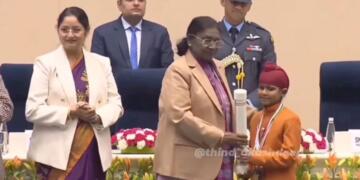
North Korea is a strange country. Born out of the vicissitudes of World War II, it remains to this day, the world’s only Stalinist regime. Perched precariously on the North Eastern corner of China, the survival of North Korea, surrounded as it is by mortal foes such as Japan and South Korea, can be credited to its maverick leaders who have used the policy of blow hot, blow cold to get most concessions out of the west and have used those concessions to build a mighty military state.
In the 1950s, North Korea used the prevailing Cold War to throw its war machine onto South Korea that was struggling to stay afloat. In spite of generous help from Messiers Stalin and Mao, North Korea failed in its objective and ended up in the black list of United States that sacrificed thousands of its men to retain its toe hold in South Korea. Ever since then, North Korea has continued to feature on United States’ Axis of Evil list. With Iraq gone and Iran having turned docile, as of 2016, North Korea remains the sole Axis of Evil in the world. For years, North Korea played a game of hide and seek with IAEA’s nuclear inspectors, claiming that it had no intention to build a Nuclear weapon. But then in 2006, North Korea shocked the world by exploding a nuclear device, which was widely dismissed as being a fizzle, but demonstrated the regime’s real objective.
In 2009 and then 2013, North Korea tested more Nuclear weapons. Just as the Korean peninsula seemed to be settling into a routine (routine by North Korea’s standards) rhythm, North Korea ushered in the New Year by claiming to have exploded a Hydrogen Bomb. The pronouncement which is being analyzed by scientists, if confirmed, poses a new challenge in another troubled corner of the world.
For seasoned North Korea watchers, this news, though shocking is no news at all. The North Korean regime is widely known to spring surprises on the unsuspecting international community. Even China that remains the only friend of North Korea was taken aback by this development. The nuclear test happened 50 miles away from the Chinese border and statements of Chinese leadership indicate that they had no inkling of this development. As recently as October 2015, the Chinese leadership had received assurances that North Korea would test no more nuclear weapons. President Xi is already under intense pressure to control his idiosyncratic ally. Analysts believe that there would be intense pressure on China to rein in North Korea.
For Japan and South Korea, this is ominous news as it creates existential doubts for both these nations. South Korea got a taste of North Korean aggression in 2010, when during the Yeonpeong incident, North Korea fired over 170 shells and rockets at South Korean military and civilian targets, killing 4 South Koreans. Just a few months before this, a South Korean corvette was sunk allegedly by a North Korean torpedo, killing 46 seamen. The Japanese too are understandably concerned about the nuclearization of the Korean peninsula. Japan lies in easy reach of North Korean missiles. In fact, in 1998, a North Korean ballistic missile under test crossed over Japan before falling into the Pacific Ocean.
But it is the US that is most troubled by this development. America finds itself facing one insurmountable challenge after another. From an unstable Middle East, to an aggressive Russia, to Iran-Saudi Arabia spat, to the growing powers of IS, United States would have thanked the almighty for keeping East Asia stable at this point of time. North Korea has the potential to pit the US against China, as it did once before. This is a confrontation that Americans are keen to avoid.
Since its creation, North Korea has been ruled by three generations of Kims. The eldest, Kim I Sung, or, ‘Great Leader’ ruled from 1945- 1994 as the head of Korean Workers’ Party. The magnitude of adulation for him often borders on fanaticism. In fact, when he died, millions of North Koreas could be seen gathering and weeping at his demise. Generations of North Koreans had been brought up on fables and propaganda stories of how great their leader war. In fact, shortly after Kim Jong-il’s death, The North Korean media reported the ice on top of Mount Baekdu (Kim il Sung’s purported birthplace) was said to have cracked while a mysterious red glow allegedly appeared over “Jong-il Peak”.
Kim Il Sung presided over a bloody era in North Korean history. His Korean War gamble caused the death of 3 Lakh north Koreans and another lakh or so Chinese. His Juche, or Self-reliance philosophy, a Korean spin on Communism, put North Korea decades behind its neighbours in economic terms. Kim Il Sung was followed by the bouffant hair style wielding Kim Jong Il. The collapse of the Soviet Union, North Korea’s biggest benefactor, ushered in years of famine, decimating the country side and claiming 3 lakh lives, and all this while, Kim Jong Il worked on his military first, Songun policy. Under the policy, all resources were appropriated for the military, leaving non-military civilians at God’s mercy.
Initially, Kim Jong Il made moves for reconciliation amongst the two Koreas. In 2000 and 2004 olympics, teams from both Koreas marched under a common flag. However, things took a turn for the worse in mid 2000s. With George Bush making no attempts to accommodate North Korea, Kim Jong Il, exploded a Nuclear devices in 2006 and 2009, upping the ante against the United States.
The nuclear technology had been made available to Kim Il Sung by Benazir Bhutto in 1994, in exchange for North Korean missile technology. Kim Jong Il died in 2011 and is widely referred today as the ‘Dear Leader’. Hysterical masses of North Koreans could again be seen weeping for the demise of their beloved leader. All this, while North Koreans starved or were beaten into submission. Kim Jong-un, took over reins of the regime as the third Kim. Young, corpulent and Swiss educated, Kim Jong-un was expected to inaugurate reforms that would bring relief to millions of starving North Koreans. Au contraire, Kim Jong-un, commenced with a purge in the Korean workers’ Party. By 2013, 5 of the 7 men who had escorted his father’s hearse had been executed. The tensions with South Korea, the continued nuclearization of North Korea and the thumbing of international law have picked up since his elevation as North Korea’s leader.
As the world struggles to deal with North Korea, as leaders express anger, anxiety and bewilderment, the conditions in North Korea continue to worsen. Human rights in North Korea are mostly nonexistent. The entire landscape is dotted with labor camps, where generations of North Koreans are incarcerated. Religious freedom is not tolerated and Christian missionaries and Buddhists are at the receiving end of State atheism. Food situation is dire and North Korea’s Songun, or military first policy has made subsistence for millions of North Koreans impossible. North Korean exiles share tales of pervading fear, omnipresent propaganda and widespread fear of retribution.
A weird caste system that puts those with party or military links at the top of the hierarchy pervades. While Kim Jong-un and his father and his grandfather before him, feast on caviar and exotic wines, ordinary North Koreans struggle to make ends meet. The existence of North Korea as a repressive regime was bad in itself, but a North Korea with Nuclear weapons and a Hydrogen bomb spells catastrophe for the civilized world.



























